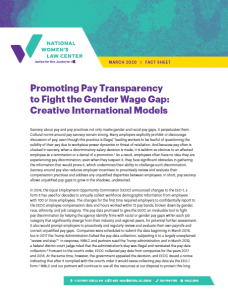Abortion rights, women of color, and LGBTQI+ people are under attack. Pledge to join us in fighting for gender justice.

 Secrecy about pay and pay practices not only masks gender and racial pay gaps, it perpetuates them. Cultural norms around pay secrecy remain strong. Many employers explicitly prohibit or discourage discussion of pay, even though this practice is illegal, leading workers to be fearful of questioning the validity of their pay due to workplace power dynamics or threat of retaliation. And because pay often is cloaked in secrecy, when a discriminatory salary decision is made, it is seldom as obvious to an affected employee as a termination or a denial of a promotion. As a result, employees often have no idea they are experiencing pay discrimination; even when they suspect it, they face significant obstacles in gathering the information that would prove it, which undermines their ability to challenge such discrimination. Secrecy around pay also reduces employer incentives to proactively review and evaluate their compensation practices and address any unjustified disparities between employees. In short, pay secrecy allows unjustified pay gaps to grow in the shadows, undetected.
Secrecy about pay and pay practices not only masks gender and racial pay gaps, it perpetuates them. Cultural norms around pay secrecy remain strong. Many employers explicitly prohibit or discourage discussion of pay, even though this practice is illegal, leading workers to be fearful of questioning the validity of their pay due to workplace power dynamics or threat of retaliation. And because pay often is cloaked in secrecy, when a discriminatory salary decision is made, it is seldom as obvious to an affected employee as a termination or a denial of a promotion. As a result, employees often have no idea they are experiencing pay discrimination; even when they suspect it, they face significant obstacles in gathering the information that would prove it, which undermines their ability to challenge such discrimination. Secrecy around pay also reduces employer incentives to proactively review and evaluate their compensation practices and address any unjustified disparities between employees. In short, pay secrecy allows unjustified pay gaps to grow in the shadows, undetected.

